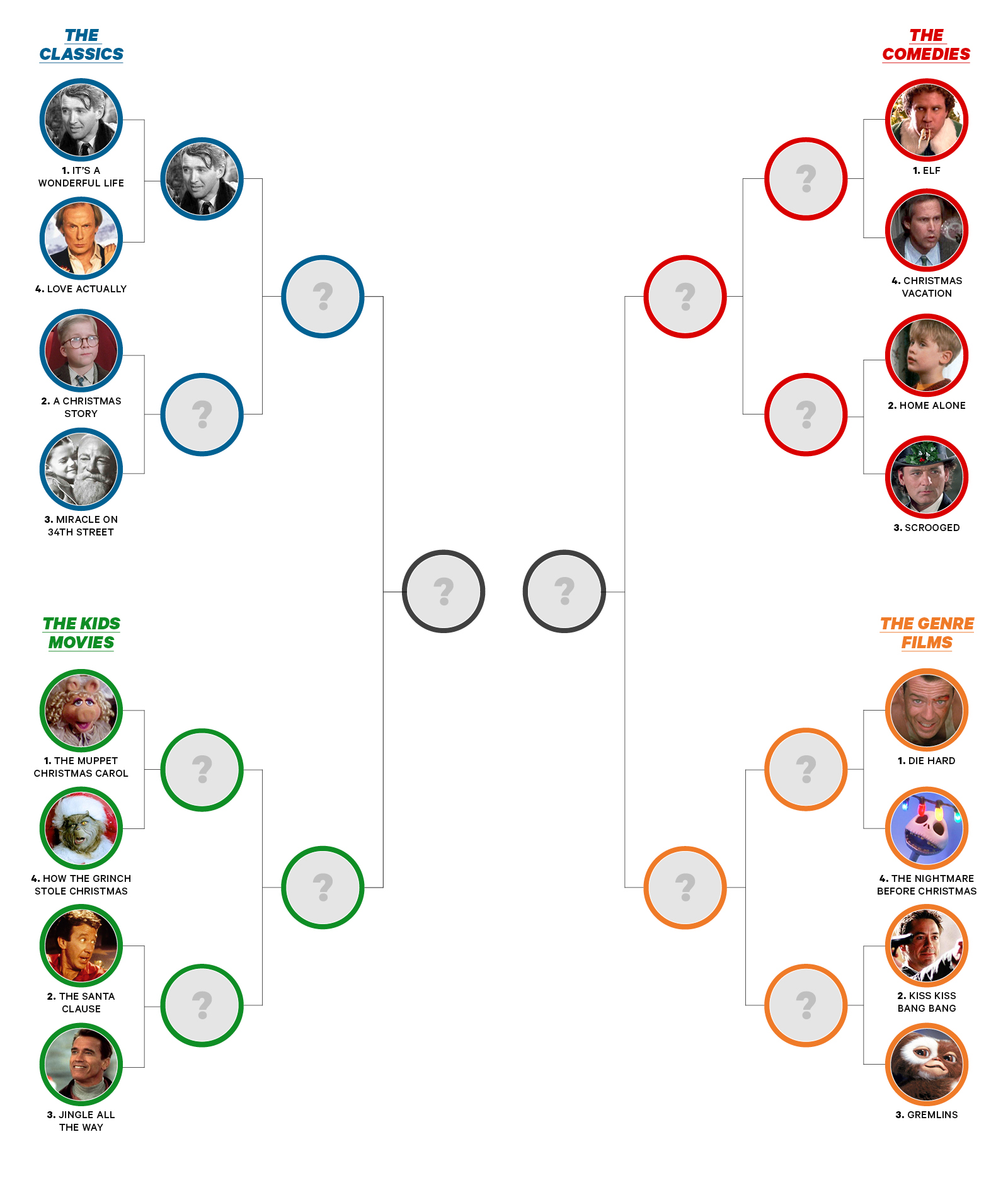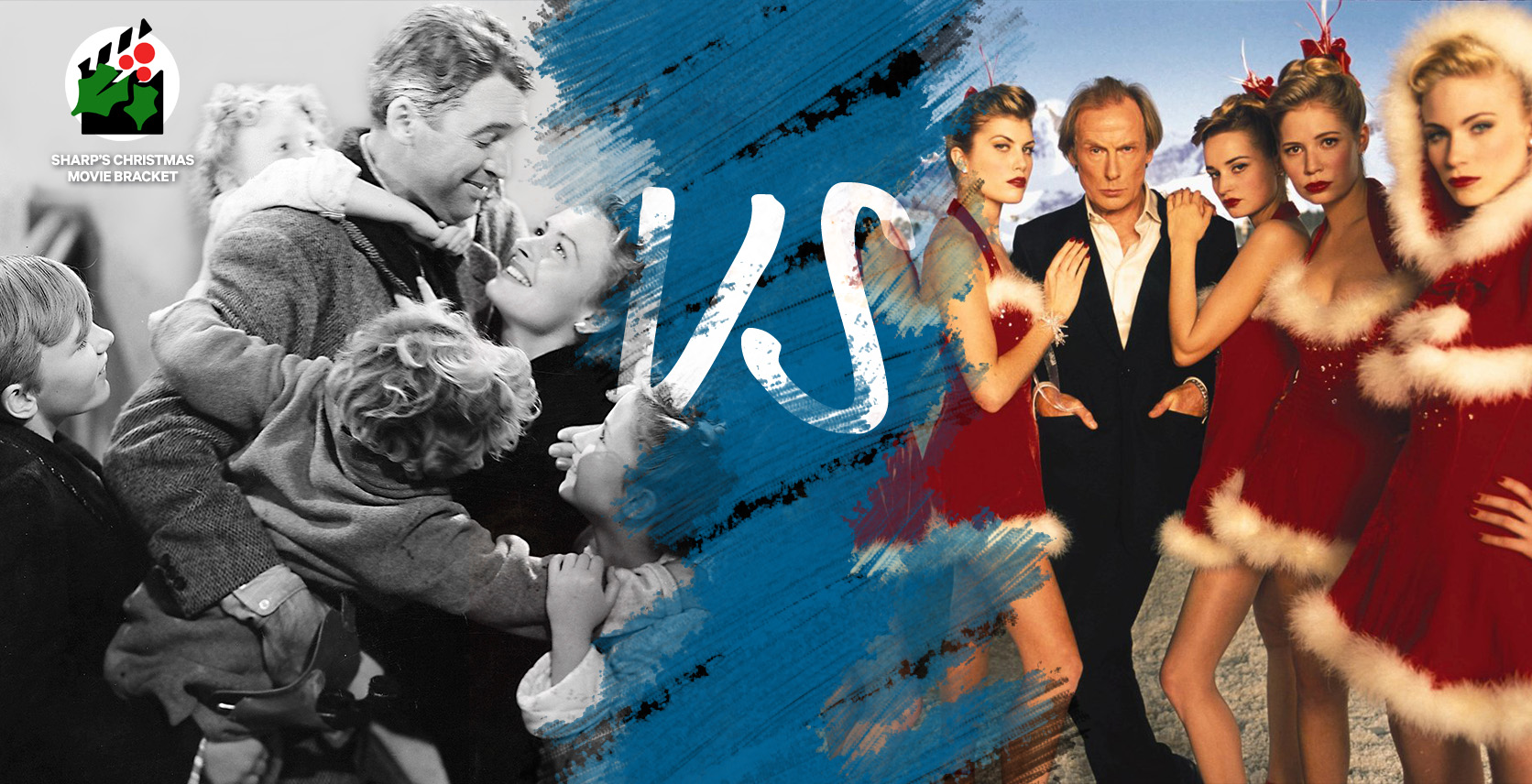Christmas Movie Smackdown: ‘Love Actually’ vs. ‘It’s a Wonderful Life’
To read more of Sharp’s Christmas Movie Smackdown, click here.
It’s hard to make a new holiday classic. So many Christmas movies we think of as classics became so not necessarily because of their quality — especially by today’s standards — but through repetition. The holiday canon was built by television networks looking for cheap, relevant content. And movies, especially old movies, fit the bill nicely. Soon, they became laced with nostalgia and happy associations, until they became inextricably linked to Christmas. It’s not that all classic holiday movies are bad, it’s that their quality is inflated by tradition. While I have never watched the entire stop-motion Rudolph special, I refuse to believe people watch it every year because it’s superb cinema.
For the purpose of this competition, we’re calling Love Actually a classic. It’s only a little over 10 years old, but unlike so many other holiday-themed films, it immediately lodged into people’s consciousness. It overwhelmed people with all it’s celebrities and stories and cute kids and British-ness. If networks still played movies, they’d run Love Actually every year. Families would watch it together, and feel close (and also a little awkward, what with all the sex).
So, if we accept that Love Actually is a new classic, the question is whether it’s better than the quintessential Christmas classic, It’s a Wonderful Life. The trouble with comparing an old movie to a new one is that, inevitably nostalgia gets in the way. Just ask anyone who waited until their 20s or 30s to see the original Star Wars movies (believe it or not, these people do exist). They’ll tell you that the movies are fine, but they don’t see what the big deal is. It’s a Wonderful Life is a little like that. Maybe it’s not that great a movie. If it came out today, it would be an anomaly. Long. Discursive. Slow as a sermon, and just as religious. It’s telling that Love Actually survives by throwing about a dozen different story lines at you, and still feels shorter than It’s a Wonderful Life (even though it’s actually five minutes longer).
On the surface, the two movies don’t have much in common. Love Actually presents a series of loosely connected narratives that explore love in many of it’s forms. From the love that exists between a Prime Minister and a junior member of his staff, to the love that blossoms between an unattractive brit and four comely American bar girls (including Betty Draper before she was Betty Draper). And all the myriad other forms of slightly misogynistic love. It’s a Wonderful Life, on the other hand, tells the brutal story of a man who puts his own dreams forever on hold so that one day, when he’s facing prison and bankruptcy, he can see how through his begrudged selflessness, he made his town a better place (though, to be perfectly honest, Pottersville did seem like it would have been a more fun place to visit).
I alluded to Love Actually’s treatment of women—which, seriously, is not great—but It’s a Wonderful Life isn’t much better. Sure, it’s a product of a different time, but implying that George Bailey’s wife, Mary (who is beautiful), would somehow become a dowdy librarian spinster without the existence of her man, isn’t exactly positive. Nor, frankly is there anything wrong with being a librarian! A girl’s got to work! Also, it should be noted: both films could have used an editor. It’s a Wonderful Life sketches George Bailey’s entire life and you feel every minute of it (until, oddly, it skims over WW2, covering about a decade in minutes, as if Frank Capra realized at the last moment that he had a lot of story to cover—like a person writing a Happy Birthday poster). You feel as beaten down as George does by the end. And Love Actually could excise entire characters and story lines without affecting the overall narrative.
While we’ve highlighted some of the standards by which we’ll judge the movies in this tournament, with these two particular films it comes down to two things: relevance and pay-off. And by those criteria, It’s a Wonderful Life is the clear winner.
For all it’s exploration of How We Experience Love in a Post-9/11 World (yes, they reference 9/11 at the very start of the movie), in all it’s complicated, heart-warming, tragic, and problematic forms, Love Actually doesn’t actually say much more than, hey, isn’t love (or infatuation and sexual attraction) awesome. Love Actually is a trifle. A Christmas treat. And while the holidays would be nothing without sweets, by themselves they are empty.
It’s a Wonderful Life, on the other hand, is almost too real. Put aside it’s supernatural elements (and the apocryphal doctrine it tacks on near the end about bells ringing and angel-wing-getting), it’s a story about sacrifice and class struggle. It’s a message that will always be relevant, maybe especially for men, because it lets you know your work, however overlooked and seemingly unimportant, does matter. Life, while it might not be wonderful exactly, does have meaning.
And it’s that message that gives It’s a Wonderful Life its emotional wallop. Thanks to an incredible Beach Boys song, the ending of Love Actually feels substantial, or at least pretty. But, It’s a Wonderful Life will make you weep. Because you’ve been through all the shit that George Bailey has been through. Not just because you’ve watched it for what feels like hours, but because you’ve had dreams you’ve put aside, you’ve had family members disappoint you, you’ve pushed whatever Sisyphean boulder up your own hill, and you need to feel like you’re not alone. Your work has been noted, and you’ll be okay. In the end, that’s a pretty small victory, but it doesn’t feel like it.
THE WINNER: It’s a Wonderful Life











